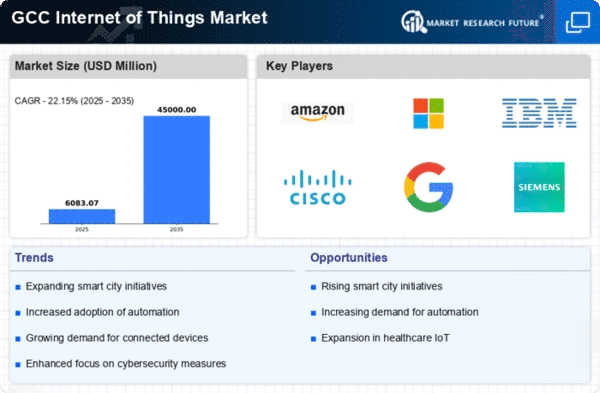Emergence of 5G Technology
The rollout of 5G technology is poised to revolutionize the Internet of Things Market by enabling faster and more reliable connectivity. In the GCC, 5G networks are being deployed at an accelerated pace, with several countries aiming for nationwide coverage by 2025. This next-generation technology offers significantly lower latency and higher bandwidth, which are critical for supporting a vast number of connected devices. As a result, industries such as automotive, healthcare, and smart cities are likely to benefit from enhanced IoT applications, including autonomous vehicles, remote patient monitoring, and real-time traffic management. The potential of 5G to facilitate seamless communication between devices could lead to innovative solutions that were previously unattainable. Thus, the emergence of 5G technology is expected to act as a catalyst for the growth of the internet of-things market, unlocking new opportunities for businesses and consumers alike.
Rising Adoption of Smart Devices
The increasing penetration of smart devices in households and businesses is a pivotal driver for the Internet of Things Market. In the GCC region, the number of connected devices is projected to reach 1 billion by 2025, indicating a substantial growth trajectory. This surge is largely attributed to the affordability and accessibility of smart technologies, which enhance convenience and efficiency. As consumers and enterprises alike embrace smart home systems, wearables, and industrial IoT applications, the demand for seamless connectivity and interoperability intensifies. Consequently, this trend fosters innovation and competition among technology providers, thereby propelling the internet of-things market forward. The integration of smart devices into daily life not only transforms user experiences but also generates vast amounts of data, which can be leveraged for improved decision-making and operational efficiency.
Increased Focus on Data Analytics
The growing emphasis on data analytics is transforming the landscape of the Internet of Things Market. Organizations in the GCC are increasingly recognizing the value of data generated by IoT devices, which can provide actionable insights for improving operational efficiency and customer experiences. The market for data analytics in the region is anticipated to grow at a CAGR of 25% through 2025, driven by the need for real-time decision-making and predictive analytics. As businesses leverage advanced analytics tools to interpret vast datasets, they can optimize processes, reduce costs, and enhance service delivery. This trend is particularly evident in sectors such as healthcare, manufacturing, and logistics, where data-driven strategies are becoming essential for competitive advantage. Consequently, the integration of data analytics with IoT solutions is likely to propel the growth of the internet of-things market, as organizations seek to harness the full potential of their connected devices.
Government Initiatives and Support
Government initiatives aimed at fostering technological advancement play a crucial role in shaping the Internet of Things Market. In the GCC, various governments are actively promoting digital innovation through funding, regulatory frameworks, and strategic partnerships. For instance, the UAE's National Innovation Strategy aims to position the country as a global hub for innovation, which includes significant investments in IoT infrastructure. Such initiatives are likely to create a conducive environment for startups and established companies to develop and deploy IoT solutions. Furthermore, public sector projects, such as smart city developments and digital health initiatives, are expected to drive demand for IoT technologies. The commitment of governments to enhance digital ecosystems not only stimulates economic growth but also encourages collaboration between public and private sectors, thereby accelerating the evolution of the internet of-things market.
Growing Demand for Enhanced Security Solutions
As the Internet of Things Market expands, the need for robust security solutions becomes increasingly critical. The proliferation of connected devices in the GCC raises concerns regarding data privacy and cybersecurity threats. Organizations are recognizing that securing IoT devices and networks is essential to protect sensitive information and maintain consumer trust. The market for IoT security solutions is projected to grow significantly, with investments in cybersecurity expected to reach $10 billion by 2025 in the region. This heightened focus on security is driving innovation in the development of advanced encryption, authentication, and monitoring technologies. Companies are likely to prioritize security measures in their IoT deployments to mitigate risks and comply with regulatory requirements. Consequently, the growing demand for enhanced security solutions is anticipated to be a key driver of the internet of-things market, as stakeholders seek to safeguard their digital assets.

















